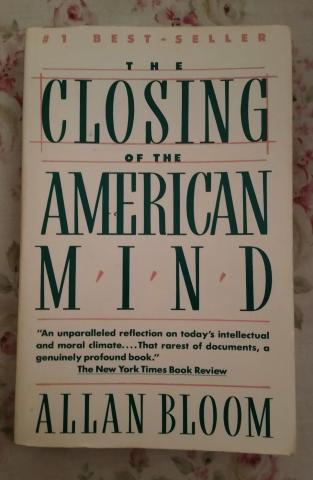Book Review: Allan Bloom's "The Closing of the American Mind"
May 22,2016
Shocking events on college campuses such as Rutgers and DePaul have made many a concerned observer wonder: "Are students becoming close-minded?" Judging by the outraged protestors interrupting speakers they disagree with and even physically storming stages for events they oppose, it would appear that indeed they are. While it might be easy to dismiss these developments as an elaborate play on the part of a few misguided millennials to draw attention to themselves, this amounts to relieving the offending parties of responsibility, of saying it's just a small group that can't be expected to behave properly. This isn't a balanced take; this is the soft bigotry of low expectations. The minds filling our universities should be the best and the brightest, the most willing to consider and debate new, controversial ideas, so shouldn't we be the slightest bit curious where this spate of intolerant, illiberal activism (and I use the term loosely) is coming from? It was precisely this question that the late Allan Bloom sought to answer in The Closing of The American Mind.
Granted, Bloom wasn't quite talking about the same situation as we have discussed so far. Penned in the late 1980's, the book was written with the intention of expressing the professor's personal and intellectual reflections on how American college campuses - and by extension, American society itself - changed within his lifetime. What he ended up publishing was a call to action, the opening of a new front in the proverbial culture wars. A gay academic of Jewish descent, Bloom found himself in the unlikely position of leading the charge against the rising forces of post-modernism and multiculturalism, earning him praise from the right and hate from the left. But politics were entirely secondary to Bloom. "No matter what conservatives may think, traditions had a beginning that was not traditional. They had a founder who was not a conservative or a traditionalist" (Bloom, pg. 212), he says, acknowledging that some degree of change is necessary. What he inveighs against however, is discarding old practices to make way for new ones without examining the case for either.
It is this great sin that Bloom charges the targets of his criticism with. not so much because of the choices they make but because of the lack of thought that goes into said choice. Describing the intellectual and emotional prospects for young Americans, Bloom argues, "This indeterminate or open-minded future and the lack of a binding past mean that the souls of young people are in a condition like that of the first men in the state of nature - spiritually unclad, unconnected, isolated, with no inherited or unconditional connection with anything or anyone. They can be anything they want to be, but they have no particular reason to want to be anything." (Bloom, pg. 87) Since students have been led to believe, whether intentionally or unintentionally, that they can make any decision they want without having to take ultimate responsibility for it, they have lost enthusiasm for the intellectual life, to say nothing of life itself. What's the point of finding out who has the right answer when you believe all of them are equally valid, that nothing bad will come of living life by the wrong answer? With these very low stakes, it is little wonder that young Americans have retreated inwards, indulging their prejudices and biases until they inevitably come into conflict with others who similarly have nothing to stand on but their prejudices and biases.
The culprits pinpointed by Bloom as responsible for this wave of listlessness are none other than Friedrich Nietzsche and other German philosophers, who in no small part overthrew the intellectual consensus grounded in ancient Greek philosophy, Enlightenment values, and political liberalism. Demolishing the rationalism that formed the basis of said consensus, the Germans ushered in a new world where God was dead and man was lost, responsible to no one but himself. Although Bloom clarifies that Nietzsche and his cohorts meant this in a very different way from how it is commonly interpreted today, he maintains that German cosmopolitans who fled their country around the time of Hitler's rise to power brought these then-en-vogue ideas with them to the US, in turn tilting the next generation of academics, psychologists, and entertainers towards the ideas of the long-dead existentialists and their 20th-century successors. He notes the irony of left-wing student activists holding views extrapolated from a figure as associated with the political right as Nietzsche, but doesn't believe it's entirely a laughing matter. Indeed, Bloom sees frightening parallels between the postmodern stupor modern day Americans find themselves in and the nihilistic decadence of Weimar Germany that created an ideological void ready to be filled by the dark forces of national socialism. In an election cycle dominated by candidates who openly demonize groups they imagine to be responsible for all the evils affecting America and pledging to use the coercive power of government against them, Bloom's fear is all the more justifiable.
There is so much more ground to cover in Bloom's arresting analysis, but to even attempt such a feat would be foolhardy. Bloom's thesis, whether you agree or disagree with it, is an original one that requires of readers the ability to understand the nuances of his thought and the willingness to seriously engage with the material being presented to them. Conveying not even a fraction of his position as I have tried in the previous paragraphs is a task in and of itself, forcing me to not only put it into my own words but make sure that I understand it correctly. In other words, the best way to understand Bloom is to read Bloom. Even when you find yourself shaking your head in befuddlement at some of his pronouncements (his take on modern music - i.e. 1980's rock and pop - is about as square as it can get), you come away feeling not angry but pleased about having heard and considered a point of view diametrically opposed to your own. If you're as open-minded as you say you are, challenge yourself and give Allan Bloom's The Closing of the American Mind a fair hearing.






